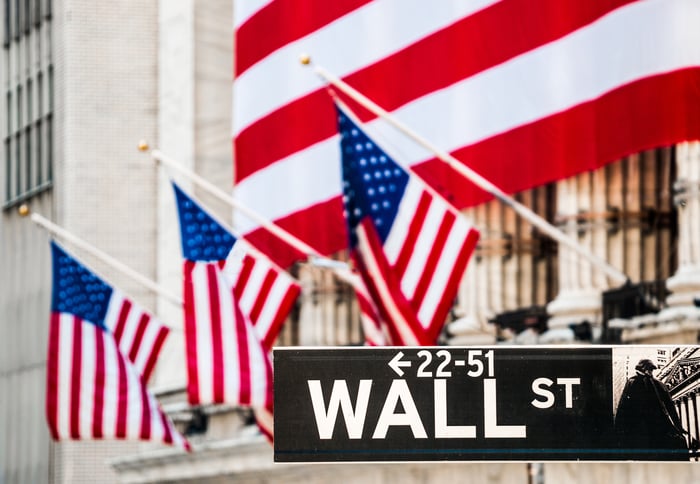Prediction: Alphabet Just Became the 4th Member of the $3 Trillion Club -- but the First $5 Trillion Stock Will Be an Outlier (No, Not Palantir or Oracle!)

Key Points
Only 11 public companies globally have ever joined the trillion-dollar club.
Wall Street's hottest artificial intelligence (AI) stocks, Palantir Technologies and Oracle, while widely-owned, are unlikely to reach the $5 trillion mark before their peers.
A dual-industry leader that can more than double its cash flow over a three-year period has the clearest path to a $5 trillion market cap.
Wall Street is home to a number of exclusive clubs. For instance, a mere 56 publicly traded companies on U.S. exchanges have increased their base annual payout for at least 50 years, which qualifies them as Dividend Kings. Further, around two dozen income stocks (not necessarily Dividend Kings) have paid a continuous dividend for a minimum of 100 consecutive years.
But perhaps the rarest club of all is the trillion-dollar plateau. Only 11 companies worldwide have ever reached a nominal trillion-dollar valuation, not including the effects of inflation. This includes all seven members of the "Magnificent Seven," Broadcom, Taiwan Semiconductor Manufacturing, Berkshire Hathaway, and Saudi Aramco, the latter of which doesn't trade on U.S. exchanges.
Where to invest $1,000 right now? Our analyst team just revealed what they believe are the 10 best stocks to buy right now. Continue »

Image source: Getty Images.
Last week, Google parent Alphabet (NASDAQ: GOOGL)(NASDAQ: GOOG) became only the fourth public company to crest the $3 trillion mark, joining Nvidia, Apple, and Microsoft.
Aside from having a globally dominant search engine that's historically commanded a 90% (or greater) share of internet search, Alphabet stock was given a boost when a federal judge ruled it wouldn't have to sell its Chrome browser in an antitrust case. It can be argued that Alphabet's cheaper valuation, relative to other members of the Mag-7, also provided a lift.
While America's quartet of $3 trillion companies would make logical candidates to become Wall Street's very first $5 trillion stock, an outlier company has the catalysts and intangibles needed to beat Alphabet, Nvidia, Apple, and Microsoft to the punch.
It's not the world's hottest AI stocks, Palantir or Oracle
The prevailing question becomes which company has the growth potential necessary to leapfrog the hardware kingpin of artificial intelligence (AI), Nvidia? Popular and widely owned choices would probably be AI-data mining specialist Palantir Technologies (NASDAQ: PLTR) and cloud infrastructure services provider Oracle (NYSE: ORCL).
Palantir's Gotham and Foundry software-as-a-service platforms have no large-scale competitors. With Gotham securing multiyear contracts from federal governments, and Foundry generating predictable subscription revenue, there's a realistic shot at Palantir sustaining a 20% to 30% annual growth rate for many years to come. We've already witnessed Palantir add close to $400 billion in market cap from its December 2022 low.
As for Oracle, it set the stage for a monstrous rally with its fiscal 2026 first-quarter operating results. CEO Safra Catz pointed to a 359% increase in remaining performance obligations (essentially Oracle's future backlog of revenue, based on signed contracts), and expects sales for its the high-margin Oracle Cloud Infrastructure segment to catapult from a shade over $10 billion in fiscal 2025 to $144 billion by fiscal 2030.
But in spite of their rapid growth rate and skyrocketing share price, neither Palantir nor Oracle are logical candidates to become the world's first $5 trillion stock.
Even if Palantir were to somehow sustain a sales growth rate closer to 35% or 40%, its price-to-sales (P/S) ratio is pushing never-before-seen boundaries for a megacap company. Historically, companies riding the wave of a game-changing technology peak at P/S ratios of 30 to 40. Palantir is sporting a P/S ratio of 125, as of the close bell on Sept. 16. History tells us this is an unsustainable premium.
Perhaps the biggest issue for Oracle is it'll need to earn the trust of Wall Street. Though its updated growth forecast has investors excited, the company itself has fallen short of consensus profit projections from analysts in three of the last four quarters.

Image source: Amazon.
This current outlier will be Wall Street's first $5 trillion stock
The magnificent stock with the most logical trajectory to a $5 trillion valuation is dual-industry leader Amazon (NASDAQ: AMZN). Though it's the market's fifth-largest company, it's still an outlier, with a current deficit of $540 billion to $1.77 trillion to the four companies above it, respectively.
Most consumers and investors familiarize themselves with Amazon through its world-leading online marketplace. Based on data from Analyzify, Amazon captured a 37.6% share of U.S. online retail sales in 2024.
But while e-commerce provides a face for the company, Amazon's bread-and-butter has everything to do with its ancillary operations. Though online retail sales account for a good chunk of revenue, these ancillary operations sport higher margins and generate the lion's share of operating cash flow and operating income. In other words, they're going to be the propellant that doubles Amazon stock and pushes it to a $5 trillion market cap.
Amazon's most important puzzle piece is, without question, cloud infrastructure service platform Amazon Web Services (AWS). Tech analysis firm Canalys estimates AWS accounted for 32% of global cloud infrastructure service spend during the second quarter, which is nearly as much as Microsoft Azure (22%) and Google Cloud (11%) on a combined basis.
AWS has been consistently growing in the neighborhood of 20% on an annual basis. Incorporating generative AI solutions and large language model tools into AWS has the potential to accelerate growth for this high-margin segment. Despite generating only 18.6% of net sales for Amazon through the first six months of 2025, AWS was responsible for almost 58% of the company's operating income.
Something else to consider is that if history holds true and an AI bubble forms and bursts at some point in the not-too-distant future, Amazon would largely sidestep any direct operational pain. While it would have to overcome weakened investor sentiment, a potential AI bubble event wouldn't meaningfully impact demand for AWS.
The other two segments of importance for Amazon are subscription services and advertising services. With the company luring billions of visitors each month to its online marketplace and growing content library, it possesses impressive ad-pricing power.
Meanwhile, Amazon has landed exclusive streaming deals with the National Football League (Thursday Night Football), and National Basketball Association. When coupled with various shopping and shipping perks, there's plenty of pricing power with Prime subscriptions.
Amazon closed out every year of the 2010s valued at 23 to 37 times its cash flow. With its cash flow per share projected to explode from a reported $11.04 in 2024 to a forecast $24.32 by 2027, there's no reason Amazon can't reach a $5 trillion valuation and trade at approximately 20X cash flow in 2027.
Should you invest $1,000 in Amazon right now?
Before you buy stock in Amazon, consider this:
The Motley Fool Stock Advisor analyst team just identified what they believe are the 10 best stocks for investors to buy now… and Amazon wasn’t one of them. The 10 stocks that made the cut could produce monster returns in the coming years.
Consider when Netflix made this list on December 17, 2004... if you invested $1,000 at the time of our recommendation, you’d have $661,694!* Or when Nvidia made this list on April 15, 2005... if you invested $1,000 at the time of our recommendation, you’d have $1,082,963!*
Now, it’s worth noting Stock Advisor’s total average return is 1,067% — a market-crushing outperformance compared to 190% for the S&P 500. Don’t miss out on the latest top 10 list, available when you join Stock Advisor.
*Stock Advisor returns as of September 15, 2025
Sean Williams has positions in Alphabet and Amazon. The Motley Fool has positions in and recommends Alphabet, Amazon, Apple, Berkshire Hathaway, Microsoft, Nvidia, Oracle, Palantir Technologies, and Taiwan Semiconductor Manufacturing. The Motley Fool recommends Broadcom and recommends the following options: long January 2026 $395 calls on Microsoft and short January 2026 $405 calls on Microsoft. The Motley Fool has a disclosure policy.







